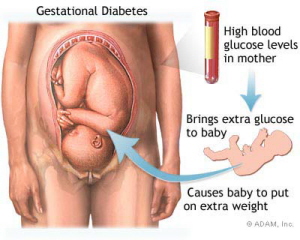Reinforcing an already common practice, a government-backed
panel says women should be screened for gestational diabetes after 24
weeks of pregnancy even if they don't have symptoms.
The U.S. Preventive Services Task Force (USPSTF) says all pregnant women who have not been previously diagnosed with diabetes should be given a blood test for the condition, which increases the risk of complications during and after birth.
"Gestational diabetes is an important condition to consider," Dr. Wanda Nicholson told Reuters Health. "It affects two people - a mother and her offspring."
Nicholson is an immediate former member of the USPSTF and an associate professor in the Department of Gynecology and Obstetrics at the University of North Carolina at Chapel Hill School of Medicine.
"It doesn't really say anything different than what's already out there, but it's going to be one more piece of support to the practice that's already in place," Dr. Yvette LaCoursiere told Reuters Health of the guideline.
LaCoursiere is the director of the University of California, San Diego's Maternal Weight and Wellness Program and was not involved with the recommendation.
Like other types of diabetes, the gestational form occurs among pregnant women whose bodies can't make or use enough insulin, a hormone that gives glucose - or blood sugar - access to the body's cells to be used as fuel.
"It's a really interesting thing," Dr. Loralei Thornburg said. "The baby and the placenta kind of want to make you diabetic."
 Thornburg was also not involved with making the new recommendation.
She is a high-risk pregnancy expert at the University of Rochester
Medical Center in New York.
Thornburg was also not involved with making the new recommendation.
She is a high-risk pregnancy expert at the University of Rochester
Medical Center in New York.
"They (the baby and placenta) try to drive the maternal blood sugar up to drive more glucose into the baby to feed the growing baby," she said. "The mother's body balances this with increased insulin and other hormones. When the body is unable to keep up with this, and the maternal glucose becomes out of balance (too high), you have gestational diabetes."
The condition affects approximately 18 percent of pregnancies, according to the American Diabetes Association.
Women who are obese, older, members of an ethnic group with an increased risk of type 2 diabetes and who have a history of gestational diabetes or a family history of diabetes are at increased risk for developing gestational diabetes, according to the USPSTF.
If left untreated, gestational diabetes can lead to a larger-than-normal baby, which can cause problems for the mother later in pregnancy and during delivery. The baby can also suffer nerve damage from pressure on its shoulders during delivery, according to the Centers for Disease Control and Prevention.
The USPSTF writes in the Annals of Internal Medicine that it found with "moderate certainty" that there is a net benefit to screening for gestational diabetes after 24 weeks of pregnancy to reduce complications.
The new recommendation is an update to a 2008 statement by the panel, which concluded there was not enough evidence to recommend for or against screening.
The panel still says there is not enough evidence to recommend for or against screening for gestational diabetes before 24 weeks.
 "What's happened between 2008 and 2013 is that there have been
several large randomized trials that have found some substantial
reductions in pregnancy-related outcomes," Nicholson said.
"What's happened between 2008 and 2013 is that there have been
several large randomized trials that have found some substantial
reductions in pregnancy-related outcomes," Nicholson said.
In the review the panel used as the basis of its recommendation, researchers found there were fewer cases of high blood pressure among pregnant women who were treated for gestational diabetes. There were also fewer larger-than-normal babies and fewer cases of babies' shoulders getting stuck during delivery among those women.
LaCoursiere said women who are diagnosed with gestational diabetes are more likely to develop 2 diabetes later on.
"It's a glimpse into someone's future," she said. "Maybe it's the window of opportunity that will allow women to change their behavior to avoid type 2 diabetes down the road."
Treatment for gestational diabetes includes diet and lifestyle changes. If those fail, medication may be necessary.
"It gets to the point that nutrition in pregnancy is important and everyone should be following a diet of less ice cream and more vegetables," Thornburg said.
Screening for gestational diabetes is covered by insurance under the 2010 Affordable Care Act - better known as Obamacare - according to Nicholson.
The U.S. Preventive Services Task Force (USPSTF) says all pregnant women who have not been previously diagnosed with diabetes should be given a blood test for the condition, which increases the risk of complications during and after birth.
"Gestational diabetes is an important condition to consider," Dr. Wanda Nicholson told Reuters Health. "It affects two people - a mother and her offspring."
Nicholson is an immediate former member of the USPSTF and an associate professor in the Department of Gynecology and Obstetrics at the University of North Carolina at Chapel Hill School of Medicine.
"It doesn't really say anything different than what's already out there, but it's going to be one more piece of support to the practice that's already in place," Dr. Yvette LaCoursiere told Reuters Health of the guideline.
LaCoursiere is the director of the University of California, San Diego's Maternal Weight and Wellness Program and was not involved with the recommendation.
Like other types of diabetes, the gestational form occurs among pregnant women whose bodies can't make or use enough insulin, a hormone that gives glucose - or blood sugar - access to the body's cells to be used as fuel.
"It's a really interesting thing," Dr. Loralei Thornburg said. "The baby and the placenta kind of want to make you diabetic."
 Thornburg was also not involved with making the new recommendation.
She is a high-risk pregnancy expert at the University of Rochester
Medical Center in New York.
Thornburg was also not involved with making the new recommendation.
She is a high-risk pregnancy expert at the University of Rochester
Medical Center in New York."They (the baby and placenta) try to drive the maternal blood sugar up to drive more glucose into the baby to feed the growing baby," she said. "The mother's body balances this with increased insulin and other hormones. When the body is unable to keep up with this, and the maternal glucose becomes out of balance (too high), you have gestational diabetes."
The condition affects approximately 18 percent of pregnancies, according to the American Diabetes Association.
Women who are obese, older, members of an ethnic group with an increased risk of type 2 diabetes and who have a history of gestational diabetes or a family history of diabetes are at increased risk for developing gestational diabetes, according to the USPSTF.
If left untreated, gestational diabetes can lead to a larger-than-normal baby, which can cause problems for the mother later in pregnancy and during delivery. The baby can also suffer nerve damage from pressure on its shoulders during delivery, according to the Centers for Disease Control and Prevention.
The USPSTF writes in the Annals of Internal Medicine that it found with "moderate certainty" that there is a net benefit to screening for gestational diabetes after 24 weeks of pregnancy to reduce complications.
The new recommendation is an update to a 2008 statement by the panel, which concluded there was not enough evidence to recommend for or against screening.
The panel still says there is not enough evidence to recommend for or against screening for gestational diabetes before 24 weeks.
In the review the panel used as the basis of its recommendation, researchers found there were fewer cases of high blood pressure among pregnant women who were treated for gestational diabetes. There were also fewer larger-than-normal babies and fewer cases of babies' shoulders getting stuck during delivery among those women.
LaCoursiere said women who are diagnosed with gestational diabetes are more likely to develop 2 diabetes later on.
"It's a glimpse into someone's future," she said. "Maybe it's the window of opportunity that will allow women to change their behavior to avoid type 2 diabetes down the road."
Treatment for gestational diabetes includes diet and lifestyle changes. If those fail, medication may be necessary.
"It gets to the point that nutrition in pregnancy is important and everyone should be following a diet of less ice cream and more vegetables," Thornburg said.
Screening for gestational diabetes is covered by insurance under the 2010 Affordable Care Act - better known as Obamacare - according to Nicholson.
